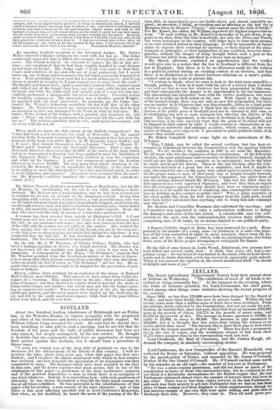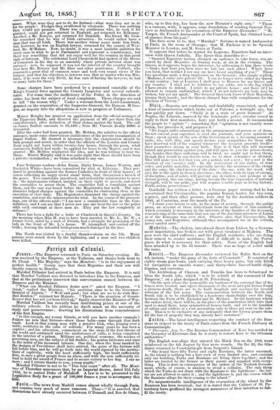IRELAND.
The Royal Agricultural Improvement Society held their annual show at Athlone on Wednesday. " The exhibition of stock of all kinds is de- scribed as being unusually fine." At the banquet in the evening, where the Duke of Leinster presided, the Lord-Lieutenant, his chief gumt, stated among other things some statistics showing the recent progress of the country. Since 1848, no less than 176,000 acres have been drained by the Board of Works; and more than double that area by private hands. Within the last twenty years more than a million acres of waste have been reclaimed. From the returns, lately collected by the Constabulary, but not yet ready for pub- lication, he learned that, since last year, there had been an increase of 83,683 acres in the growth of wheat, 114,774 in the growth of green crops, and 65,773 in the growth of flax. The increase in horses amounts to 18,000, in cattle to 25,000, in sheep to 90,000. The decrease in pigs amounted to 250,000; but it is thought that this arises from taking the returns at an earlier period than usual. "The farmers like to have their pigs to feed when they have the largest quantity to give them." There has been a permanent rise in the rate of wages ; and the workhouse returns of last week show 17,771 fewer paupers than in the corresponding week last year.
Lord Clonbrock, the Earl of Clancarty? and Mr. Justice Keogh, ad- dressed the company in similarly encouraging strains.
Lord Castlerosse, the new Comptroller of the Queen's Household, was reelected for Kerry on Saturday, without opposition. He was proposed by the parish-priest of nuke, and seconded by Mr. James O'Connell, brother of the late Daniel O'ConnelL Mr. O'Connell excited some mirth by his remarks on an old topic—the number of lawyers in Parliament.
" He was a plain country gentleman, and did not know so much of the constitution as many of those who surrounded him but he confessed he did not think it a favourable circumstance for the British empire that the last Parliament contained almost twice the number of lawyers there bad been in any other. There was no less than eighty lawyers in the last Parliament; and such was their anxiety to get into Parliament that we had no less than three of them coming over from England to Irish constituencies, though we had.lawyers enough of our own that were quite willing and quite able to discharge their duty. However, they came in. They all made great pro- asses. what were they not to do for Ireland—what were they not to do for the people ! Pledges they swallowed by wholesale. There was nothing they would not promise. There was one gentleman who, he took it for mated, ' could not get returned in England, got returned for Kilkenny. Another, a Mr. Bowyer, got returned for Dundalk. His friend Mr. Cros- bie remarked that he was of Irish extraction : he would rather have a man that was all Irish. There was another whose name made him Irish, but, however, he was an English lawyer, returned for the county of Wex- ford, Mr. M'Mahon. Now, no doubt, it was a most laudable ambition for every man to wish to go to Parliament and represent a constituency, but there was something that did not augur well for the country in this great rush of lawyers. The celebrated Lord Chesterfield bad spoken of the House of Commons in his day as an assembly where private interest alone was pursued : now, he supposed it was not the interest of the country brought over here Mr. Bowyer and Mr. Shee and other gentlemen. Cobbett, who possessed a great deal of common sense and took very sound views of the subject, said that his objection to lawyers was, that no matter who was Min- ister, if he were the very Devil, he was sure of having the lawyers, he had so many baits for them."
Some charges have been preferred by a pensioned constable of the King's County force against the County Inspector and several subordi- nates. For some time the inefficiency of the Police in the detection of crime has been the subject of local complaints. These charges are said to tell "the reason why." Under a warrant from the Lord-Lieutenant, granted on the requisition of the Inspector-General, Sir Duncan M'Gre- gor, an inquiry into the allegations is now in progress at Tullamore.
Master Murphy has granted an application from the official manager of the Tipperary Bank, and directed the payment of 401. per share from the contributories, after deduction of their claims against the bank. The call on James Sadleir amounts to 65,149/. ; from Mr. Vincent Scully 46801. is demanded.
After the order had been granted, Mr. Meldon, the solicitor to the official '
manager made some observations justificatory of private examination of James Sadleir. He deemed it necessary that the examination should be both prompt and secret, in order that the officials of the Loudon and County Bank might not learn within twenty-four hours, through the press, what statements Sadleir had made : he applied for leave to the Master, and it was granted : Mr. Meldon originated the idea,. and he was willing to bear the blame. Master Murphy said it was quite right that there should have been a private examination ; no blame attached to any one.
Four Scripture readers—John Ennis, Digby Dwan, James Warren, and Frederick White—have been committed for trial at Kilkenny. They per- sisted in preaching against the Roman Catholics in front of their houses. of course collecting an angry crowd about them, that threatened a breach of the peace. Two constables interfered, and ordered the missionaries to move on : the missionaries refused, insisted on their right to preach, and dared the constables to arrest them. The constables laid a complaint against them, and the case was heard before the Magistrates last week. The mis- sionaries lodged charges against the constables for obstructing them in the execution of their duty. The Magistrates dismissed the charge against the constables, and sent the missionaries for trial. In the course of the proceed- ings, one of the officers said—" I am now a considerable time in the Con- stabulary, and I can say that I never saw any one treat the law or the police with such contempt as these men do. They put the law completely at defiance."
There has been a fight for a bride at Clonbrook in Queen's County. On the morning when Miss H. was to have been married to Mr. L., Mr. W. a former lover, aided by a mob of friends, had a struggle for possession of the lady in the front of Mr. L.'s house. W. triumphed, and carried off the bride ; leaving the intended bridegroom much damaged in the face.
The North was visited by a fearful thunder-storm on the 7th. Many persons were struck down by the lightning, and a man and two children were killed.



























 Previous page
Previous page